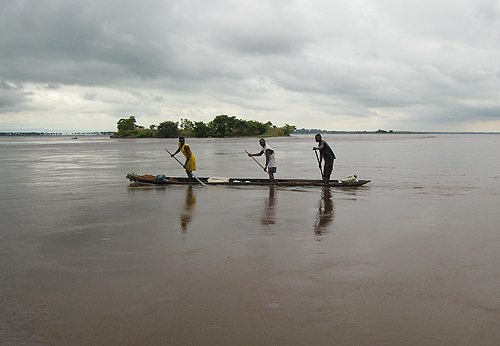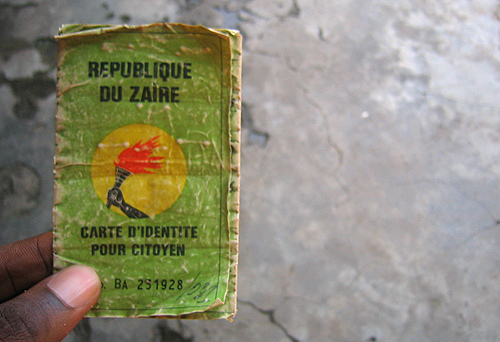
Cedric Kalonji is a reporter for Radio Okapi [1] and author of what is arguably Congo's most popular blog [2].
But in addition to his radio work and blogging, Kalonji is also a prolific photographer, and I spent the last few days poking around his photostream on Flickr. [3]
Kalonji uses photosets to tell stories, for example, how rapid erosion in the Binza Ozone neighborhood of Kinshasa [4] claims more and more homes with each heavy rain:
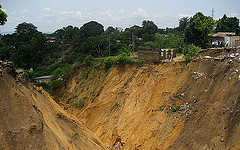

An interview with Senegalese musician [6], Ismael Lo:

And the sad story of two men arrested in Kinshasa [7], one for stealing a length of wire, the other for purchasing it:

What I really liked about these photographs is that whereas international media images of Congo tend to depict disaster or the strange and exotic, Kalonji's photographs the ordinary, everyday of life in Africa the outside world does not often see.
So I decided to ask Kalonji about his photographs and he graciously agreed to answer my questions, which I have translated here from French.
When and why did you decide to create a blog?
I created my blog in September 2005. At the beginning, it was for sharing my photos, my day-to-day life on the internet. I noticed that there were more and more people who were interested in my photos and so I posted more, adding a little text. Very quickly, there were hundreds of visitors, mostly Congolese in the Diaspora. That is where my motivation to continue with this blog, which now receives an average of 1000 visits a day, came from.
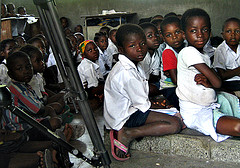
When did you start taking photos? What do you think a image can communicate that text cannot?
I started taking my first photos with a digital camera my mother received as a gift in 2002. I think that for reading and writing, one must first be educated, but with images it's different. You may not know how to write and yet you can take photos that can say as much as a written article. You may not know how to read but you can understand a situation exposed by an image.

What do you think of the image of Congo abroad? Do you think this image reflects the reality?
Congo is perceived as a country at war, in chaos, where everything is destroyed, where nothing works. This image is true in a sense because after 32 years of dictatorship under Mobutu and over ten years of war and 5 million dead, it is true to say that things are not going well.
At the same time, there is something that we often forget to note, which is that the Congolese are still smiling, welcoming and passionate for life, despite all of the traumas they have suffered. There is still human warmth, and I think that is a great wealth.

Why do you like to take photos of daily life, of ordinary moments?
Because I said to myself that there are certain things that people living elsewhere in the world cannot imagine, things that I live every day. My first motivation is to share these ordinary moments, to let people put themselves in the skin of a Congolese person, of someone in Kinshasa, by looking at these photos.
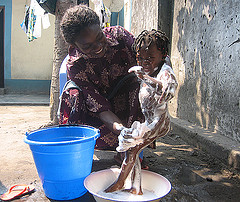
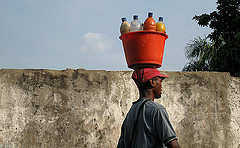
What role do citizen media play in your profession? (Or is there a role to play? The majority of your readers are abroad, in part due to the lack of internet access in Congo.) What role might they play in the future?
Citizen media allow us to go beyond borders and to build bridges with very meagre means that would be impossible with traditional media. In my case, the advantage of a blog is that it allows me to express myself in a completely independent way and to be read by readers from the four corners of the world. So I have the possibility to share my life and to connect with readers from different countries with different visions and cultures. I think that for countries like Congo and Africa in general, blogs are an especially important means of communication.
To share this passion, I've trained young Congolese on a volunteer basis to allow them to understand how blogs and new media work. The youth I have trained have already created two sites, Ndule2Kin.com [9] and rdcbel [10]. I would love to extend these trainings to other parts of my country as well as the whole of the African continent.
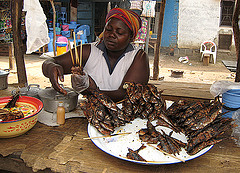
Are most of the photos you take for your reporting or are they also a hobby?
For me, photography is a hobby. I am almost never apart from my camera and I take photos almost everyday. I have thousands and it is always a pleasure to look at all of them, because they remind me of precise moments.
* * *
